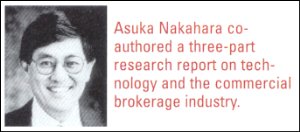
D |
ALLAS – If the financial securities industry is any indication, traditional brokerage models are in for a rude awakening. The success of online trading services for institutional and individual investors should not be lost on brokers in other industries, including the commercial real estate industry, where brokers are facing inevitable change in how they do business. Some new analysis of the issue may help clarify things.
The third and final phase of a major study of technology and the commercial brokerage industry was released here on June 14 at Realcomm, a leading technology conference for the commercial real estate industry. Co-author Prof. Asuka Nakahara discussed the key findings of the study, entitled “The Impact of New Information Technologies on the Commercial Brokerage Industry.” Nakahara is associate director of the Zell/Lurie Real Estate Center at The Wharton School of the University of Pennsylvania and the former CFO at the Trammell Crow Co. Nakahara’s colleague on the project is Prof. Joseph Gyourko, director of the Zell/Lurie Real Estate Center.
Phase One of the study measures the size and scope of the office and industrial property markets from a brokerage perspective. It concludes that the market for annual brokerage commissions is approximately US$13 billion with industry profits in excess of $5 billion.
Phase Two surveys online brokerage activities, detailing the e-commerce strategies entrepreneurs are devising for the sector. Most activity is centered on listing services with some work being done in the transactions arena. “The first sign of a distinct discount brokerage model is apparent in our review,” according to a written summary of the research. “Given how important this development was for e-businesses in the stock brokerage sector, it bears close scrutiny going forward.”
Where Change Is Afoot
Phase Three of the initiative reveals three trends that bear watching closely. “The third phase was the fun part of the project, because it had to do with what we think might happen in the industry, particularly in three areas,” noted Nakahara. The study was commissioned by the Washington, D.C.-based Society of Industrial and Office Realtors Educational Foundation (www.sior.com).
The first trend is how the proliferation of new technologies in commercial real estate will affect traditional brokerage firms’ operations. “Part of the future profitability of the larger brokerage operations with [outsourcing] clients is dependent on their ability to use computing, wireless capabilities and the Internet to make the process less expensive,” the report argues.
One key effect of more automated transaction processes is greater transparency, or a greater availability and access to data and other factors that influence transaction costs. In most industries, transparency triggers fee compression, which is a likely outcome in the commercial brokerage context as well. Just as significant will be the likely shift in compensation models from commission-based ones to those priced on the basis of hours worked. “In some accounts compensation is changing, because the nature of the work required by the customers has changed to warrant a different pay package,” said Nakahara.
The second change cited in the study is the emergence of specialist firms that are assuming the roles of, say, providing research or listing services — roles previously handled by full-service firms. “Specialty firms coming into the business have altered the business and have advantaged, in many cases, smaller firms that heretofore have not had the financial resources to run a full-fledged research department,” noted Nakahara. “They now can buy the research, which makes them more competitive.”
A Discount Model Takes Shape
The third trend to watch, according to the SIOR-sponsored research, is the possible emergence of a new type of brokerage firm based mainly on the Web. A well-financed initiative in this arena known as Zethus failed in early 2001, but the notion has merit. The research is particularly intrigued by the possibility of an Internet brokerage business line that is based on a discounting model. Discounts of at least 30 percent will be needed to attract clients to this type of firm, the authors maintain.
“We don’t see the cyberbroker model happening any time in the intermediate term for a lot of reasons, not the least of which is that to have it really work, you must commoditize real estate, and that is a long way off,” said Nakahara. But a discount model for small transactions may be within reach, he added. Offering brokerage services online in the neighborhood of a 30 percent discount will require brokerage processes to become less expensive, particularly in two ways: by substituting technology for broker time and by restructuring brokerage personnel so that they can focus on providing services deemed more important by the client.

